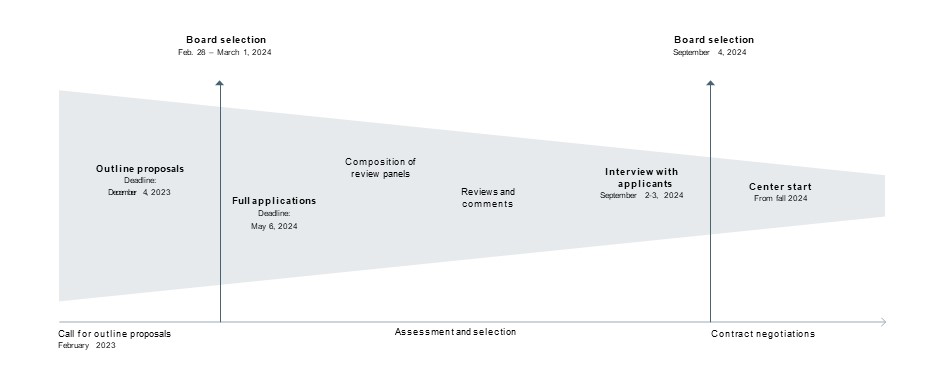Assessment and Selection of Applications
Assessment and selection of applications – Centers of Excellence
The application process is two-staged. In the first stage, prospective center leaders are invited to submit letters of interest with short outline proposals. These proposals are processed by the board alone. In the second stage, applicants submit full applications that are sent in a review conducted by a set of international experts in the field. Prior to the final selection, the board meets with each applicant.
Assessment and selection process:

Applicants may contact the secretariat if they have questions about the application process. Questions can be directed to:
Senior Adviser Johanne Juhl, e-mail:: jj@dg.dk, Tel.: +45 3318 1951
Success rate
The overall success rate from submitting an outline proposal to obtaining a center grant is approx. 6,8 percent. About 14 percent of the outline proposals move on to the full application phase, and approx. 42 percent of those applications result in new Centers of Excellence.
Selection criteria
The central criterion in the assessment of proposals for new Centers of Excellence is the quality of the proposed research. Applications must outline plans for highly ambitious research and contain original ideas with the potential to lead to real breakthroughs.
The foundation will emphasize the following dimensions:
- The research idea is ambitious and original and has the potential for real scientific breakthroughs in the relevant research field(s).
- The proposed center leader has a high standing in the international research community, the needed leadership skills, as well as the time and capacity to undertake the task of running a Center of Excellence.
- The center includes co-applicants with high-level scientific competences within their respective research field in order to establish a creative and dynamic international research environment that will also provide an inspirational training ground for young researchers.
- The focus, structure, and size of the proposed center are such that the center sets the stage for scientific ventures that are not feasible within conventional funding from other sources.
Peer Review Process
Thoroughness and transparency are key words in the assessment processes. The foundation puts a lot of effort into creating an assessment process that applicants and the scientific community in general may have a high degree of trust in.
Each full proposal is sent to three high-level international experts within the relevant scientific area(s) for external peer review. The reviewers must be true peers and, at a minimum, must possess the same international standing as the applicants.
Each reviewer is asked to deliver a report of three to five pages according to some ‘Guide for Reviewers’.
Transparency and trust
The foundation emphasizes an open and transparent process. Reviewers and applicants will know each other’s identities. Before the foundation assembles the panel, the applicant will be given the opportunity to comment on the list of proposed reviewers’ professional complementarity. The foundation has chosen this process in order to ensure that the composition of the expert panel is relevant to the applicant’s field of study. Further, applicants will be able to comment on the reviews prior to the board’s final selection.
Declaration of conflict of interest
In order to ensure board decisions are not influenced by biased reviewers, both reviewers and applicants are asked to declare a possible conflict of interest, before the applications are sent out for review. If a conflict is identified, the reviewer will not be used.
Further information can be found in the Foundation’s Guidelines for Conflicts of Interest here.
Composition of review panels
Each applicant may submit the names of three experts, one of whom will be chosen by the foundation to serve on the panel of reviewers that assess the application. The foundation will choose the other two reviewers based on recommendations from external or internal sources.
Even though several applications may fall within the same topic or discipline, reviewers are as a general rule not asked to assess more than one application.
Interview
The board conducts a short interview with each applicant (proposed center leader) prior to the final decision. During the interview, the applicant is asked to present the overall research idea and to elaborate on the strategy for realizing the idea.
Board processing and decision
The board bases its decision on:
- the full applications
- the three peer reviews for each application
- the applicant’s responses to the reviews
- the interview of the proposed center leader
The peer reviews serve as an important input to the board’s decision, but it is the board that makes the final decision.
The board has thorough discussions of each proposal/application arguing in each case why an application should or should not be funded. Ultimately, the board must choose to fund relatively few research proposals from a large number of exceptional applications.
The formation of new centers
After the board makes its final decision, the foundation and the center leader initiate negotiations with the host institution. It should be noted that no funding is granted before the final contract has been signed.
An official inauguration of the new center is held shortly after it starts operating.
